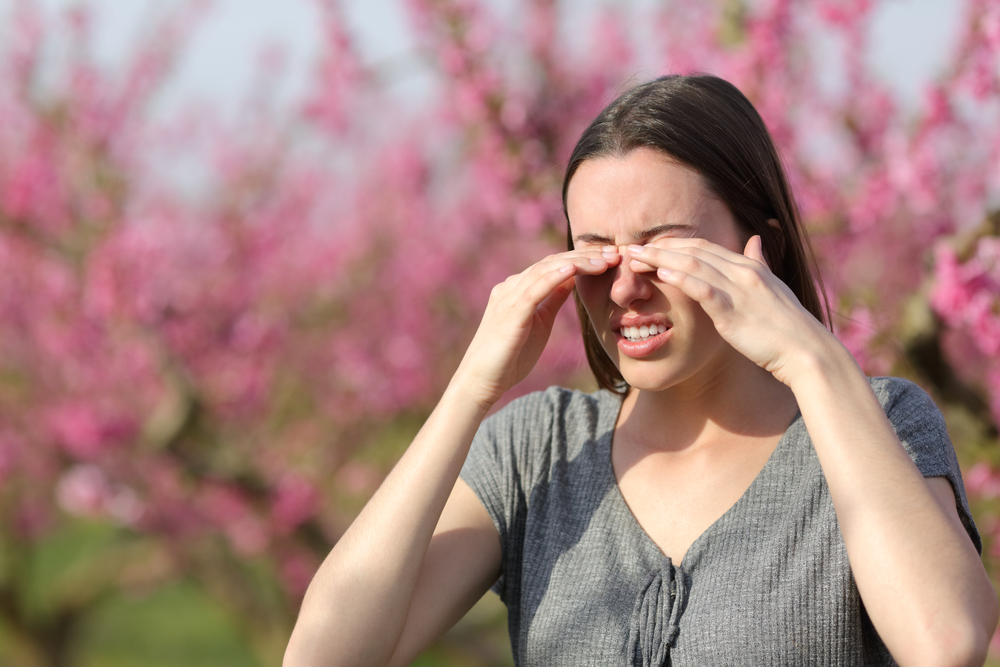
Springtime means spending time outdoors and enjoying the blooming flowers and greenery. While spring brings welcome relief after wintertime, it can also bring about uncomfortable symptoms with seasonal allergies.
Along with seasonal allergies, you may notice that your eyes are more dry in the spring. Are these two things connected? Keep reading to learn more about dry eye and how it connects to seasonal changes!
What Is a Dry Eye?
Dry eye is a condition that impacts the eye’s tear film. This tear film protects the surface of the eye and has three layers.
When working correctly, the eye film is stable and has enough lubrication.If the tear film is upset or disrupted, it can cause dry eye, also known as dry eye disease.
While dry eye can have many causes, it most often happens when the eye isn’t producing enough tears to keep the eye lubricated. Dry eyes may also occur because the tears evaporate at a rapid rate.
What Are the Symptoms of Dry Eye?
The symptoms of dry eye can be difficult to deal with, so it’s frustrating when these symptoms increase during the spring. The most common dry eye symptoms include:
- Stinging or burning feelings in your eyes
- Scratchy sensations in your eyes that you want to itch
- Increased sensitivity to light
- Feeling like something is in your eye
- Watery eyes that occur as your body tries to overcompensate from dry eye irritation
- A stringy mucus around the eye
- Blurry vision
Many of these symptoms are uncomfortable and decrease your quality of life, and you may notice they worsen during the spring.
What Causes Dry Eye?
Dry eye has many possible causes, as many factors can disrupt the tear film. If even one of the three layers is impacted, it can cause dry eye.
Some of the most common causes of dry eye include:
- Autoimmune diseases
- Hormonal changes
- Allergic Eye Disease
- Eyelid gland inflammation
- Seasonal allergens
- Decreased tear production due to aging, medications, or medical conditions.
Because there are many potential reasons for dry eye symptoms, seeing an ophthalmologist or optometrist is usually the best way to figure out the issue and find relief.
Do Allergies Worsen Dry Eye Symptoms?
Allergies are a possible cause of dry eye. Many people encounter common allergens in the spring, such as pollen. So, as your seasonal allergies worsen, you may experience dry eye.
If you notice a dry eye only during the spring or if your dry eye gets worse in spring, seasonal allergies are likely the cause, but it’s still a good idea to see an eye doctor to be sure. To help reduce dry eye in the spring due to allergies, you can try these tips:
- Wear protective eyewear when gardening or spending time outside
- Use air purifiers
- Wash your hands frequently, especially after time outside or after touching pets
- Use artificial tears to help flush out allergens
Unfortunately, many antihistamines that help with allergies can increase dry eye symptoms, so speak to your eye doctor for more recommendations.
Relief From Dry Eye At Simone Eye Center
While dry eye can have many underlying causes, spring allergies may increase dry eye symptoms in some people, especially if you’re prone to allergies. Still, because dry eyes can have many potential causes, it’s best to see an eye doctor when experiencing these symptoms.
Are you experiencing dry eye symptoms? Schedule an appointment at Simone Eye Center in Warren or Macomb Township, MI, today!


